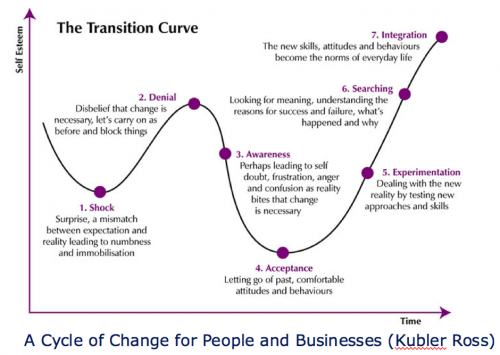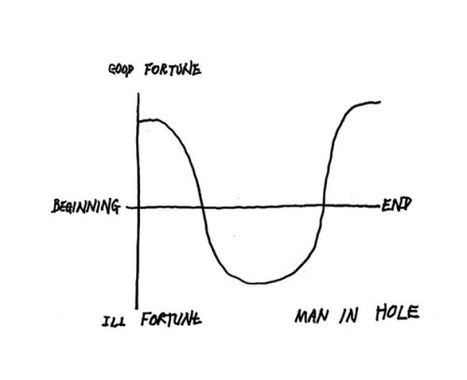The Kubler Ross Change Curve originated from her work on the 5 Stages of Grief. There’s a direct correlation to the stages people go through when there is a change in an organization, team, or even society.

Failing to plan for change, even if it was as “simple” as deploying new accounting software or initiating sales training, can lead to disengaged staff, disruption of services, or attrition in your business.
Why?
Because people don’t like change. Especially when “normal” is relatively comfortable. Not perfect or even good, mind you. Just comfortable.
Example: how’s everyone dealing with COVID 19 and home quarantine?
It’s not as if everyone relished getting up in the morning and fighting traffic for the morning commute or surviving the “morning crush” to get kids off to school, etc.
And, yet, here we are, grieving about the pause in our otherwise normal routines.
It’s the same way for whatever passes as “normal” in your business.
You may think normal isn’t good enough and change is warranted.
But when you change, everyone who was comfortable with how things used to be will need to go through the same change process to get to the other side where they “integrate” the new skills, attitudes, and behaviors you want to make into the “new normal.”
And that goes double for operations people who, by temperament and personality, tend to be especially uneasy with change.
So you have a choice:
- Plan for that grieving process and figure the secret way to accelerate through it, or
- Get sabotaged by it.
Yes, there IS a secret way to accelerate through it.
It’s called storytelling.
I first stumbled on this connection when I watched the following video on the shape of stories:
Amazing, right?
Kirt Vonnegut wrote his master thesis on that same subject, before becoming one of America’s most famous authors.
Notice how similar the Kubler-Ross change curve is to the story curve?

That’s not an accident.
Story curves reflect change curves because stories are instruction manuals on dealing with change.
Stories are mental “flight simulators” for successfully navigating life. And life is all about change.
That’s why there’s no such thing as a popular story about good things happening to good people, where everyone’s happy and content the whole time.
No one wants to read that because there’s no survival information in it. There’s nothing to “interest” you in the story.
So how do you use this insight to accelerate through the grieving process and successfully lead transformational change?
Use the power of story to temporarily fast-forward to that happy ending and have them, from that safe, happy vantage point, look back at the precipice they’re standing on now.
What will their future selves thank them for doing, right now?
You might think that dealing with a new sales system or new scheduling software or the launch of a new branding campaign is scary, but compare that to facing a battling army that outnumbers you five to one. And in that latter situation, here’s how Shakespeare’s King Henry V handled that challenge, using exactly the technique I just described:
Use the power of story to get your people mentally engaged with a future worth fighting for now, and then give them a way to in-group and bond over the struggles of losing their old normal, in order to make the acknowledgment and acceptance part of the process communal in nature.
As G.K. Chesterton put it: “Fairy tales are more than true — not because they tell us dragons exist, but because they tell us dragons can be beaten.”
Use the power of story to help your people understand that the “dragon” they’re facing can be beaten — and that life will be better on the other side of that battle.
Use the power of story to give them a glimpse of just how much better life will be on the other side and how grateful their future selves will be that they worked together to slay that dragon.
Do that and you’ll not only be able to navigate past this current loss of normal, you’ll be able to own that bright tomorrow waiting for us on the other side.
Good Selling.
- Flattery Through Storytelling - October 7, 2025
- Combining Sales Activation and Long-term Branding - September 26, 2025
- 3 Techniques That Work on Highly Skeptical Audiences - September 17, 2025
- Futuristic Game for the Ad Masters - July 11, 2024
- Classical Conditioning: Pavlov’s Dog in Advertising - June 20, 2024
- Hear, See, Speak No Advertising - June 9, 2024
